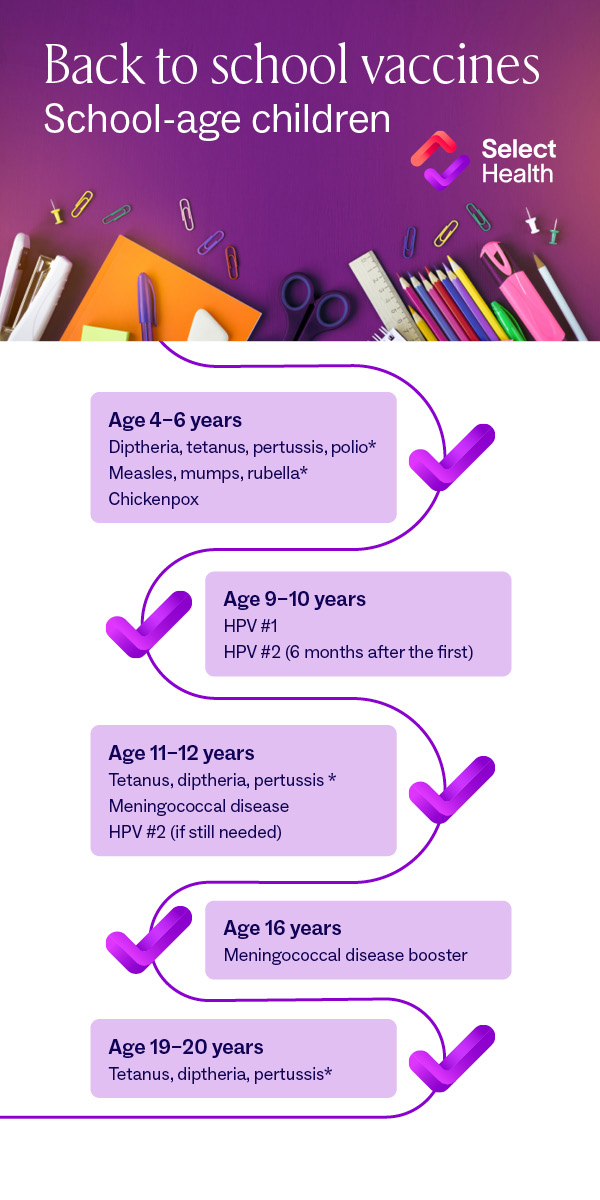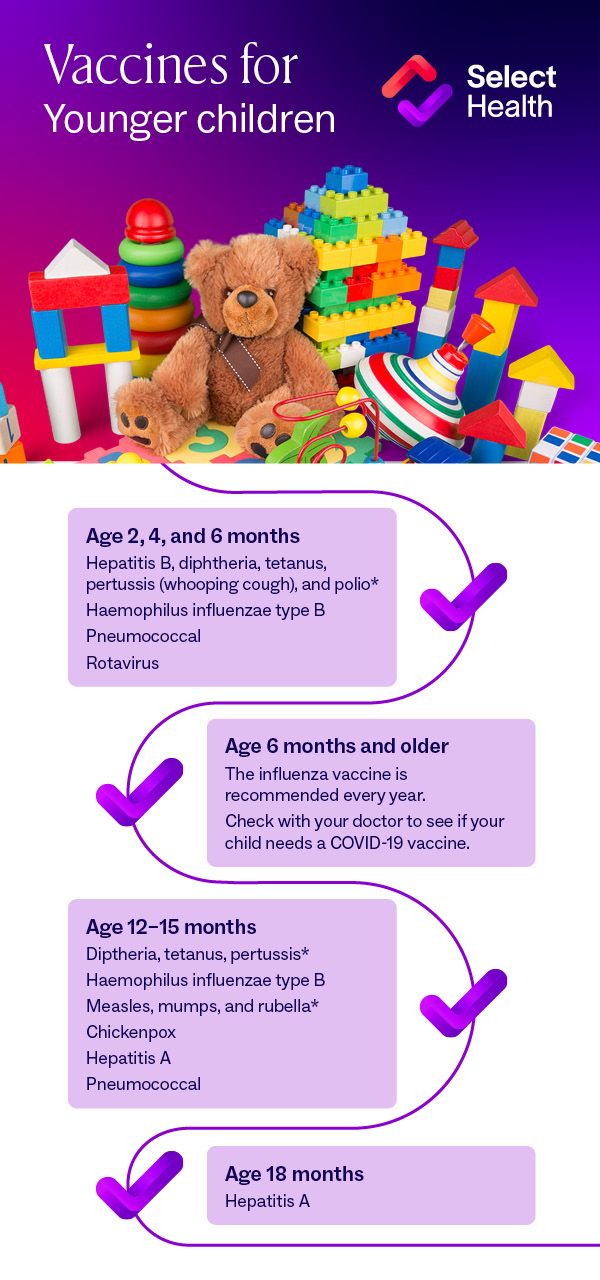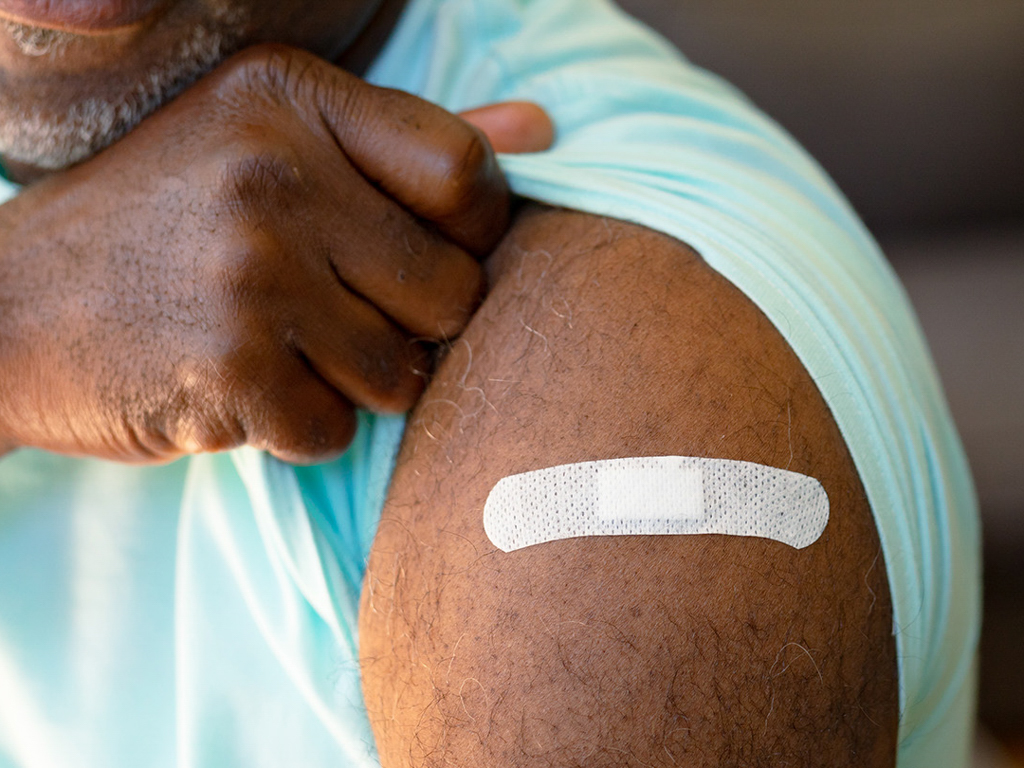Backpack? Check.
Lunchbox? Check.
New pencils? Check.
Vaccines?
There’s a lot to do for the new school season. Along with fulfilling a teacher’s list of items, buying new school clothes, and coordinating a carpool schedule, it’s also important to carve out time for your child’s vaccines.
Anyone who is around children knows how quickly infections can spread, so protecting your child’s health with routine vaccines can make a big difference.
WHY DO KIDS NEED VACCINES?
The purpose of vaccines is to help the body’s immune system fight germs. Each vaccine you get fights a different disease. The antigen is the main ingredient of a vaccine. It's usually made up of weakened or killed bacteria or viruses, bits of their genetic material, or a bacterial toxin treated to make it non-toxic.
When you get a dose of a vaccine, your body’s natural defenses kick in and learn how to protect itself from that specific disease.
There are many childhood diseases that can make kids seriously ill. Getting the recommended vaccines can help prevent unnecessary suffering.
Dr. Krista Schonrock M.D. says “Many diseases are less common than they were in the past because of vaccines. But what we’re seeing now is an increase in some of these diseases that were pretty rare. They’re becoming more common,” she explains. “Measles and whooping cough are examples of that. They are preventable with the vaccine.”
So what shots should your child get? Well, it depends on their age.
WHAT IS THE CHILDHOOD VACCINE SCHEDULE?
Doctors and medical professionals recommend certain vaccines for certain ages.1 Here’s what your school aged child needs:

*These antigens listed are often combined into one shot.
The influenza vaccine is recommended every year for those age 6 months and older. Check with your doctor to see if your child needs a COVID-19 vaccine.
Little ones not quite old enough for school should follow this schedule:

*These antigens listed are often combined into one shot.
The influenza vaccine is recommended every year for those age 6 months and older. Check with your doctor to see if your child needs a COVID-19 vaccine.
THE DIFFERENT TYPES OF VACCINES EXPLAINED
Here's a brief description of the vaccine-preventable diseases and the common symptoms:
What is tetanus?
Tetanus is a bacterial infection that causes lockjaw, muscle spasms, and other serious symptoms. It is nearly always fatal.
What is pertussis?
Pertussis, more commonly known as whooping cough, is a respiratory infection. It can cause violent coughing fits that can be dangerous for babies.
What is diptheria?
Diptheria is a toxin that can cause skin and respiratory infections. Those who develop the respiratory version most commonly develop a sore throat, weakness, fever, and swollen neck glands.Some diptheria strains kill healthy tissue in the respiratory system, creating a thick, gray coating of dead tissue in the throat known as pseudomembrane. This can make it hard to breathe and swallow.
What is haemophilus infuenzae type B?
Though it sounds like the flu, haemophilus infuenzae type B is not actually a flu strain. However, the bacteria can cause a wide range of illnesses. These can vary from mild conditions, such as ear infections, to more severe diseases like pneumonia, bloodstream infections, meningitis, and cellulitis, and more.
What is measles (rubeola)?
Measles is a very contagious disease that causes high fevers, cough, runny nose, red and watery eyes, and a rash. Anyone can get it, but children under five are at a higher risk of developing serious complications.
What is mumps?
Mumps is a contagious viral disease that causes puffy cheeks and a swollen, tender jaw. It attacks the salivary glands under the ears, making them swell.
What is rubella?
Rubella is a contagious viral disease that causes a red rash, fever, and sore throat. It can be especially serious for pregnant women, as the virus can cause miscarriage or serious birth defects.
What is meningococcal disease?
Meningococcal disease is a serious infection that can be fatal. The bacteria can either cause meningitis or a bloodstream infection. Meningitis can cause symptoms including fever, stiff neck, headache, confusion, nausea, and more. Bloodstream infections may cause fever and chills, rapid breathing, sever aches or pains, diarrhea, and more. It is potentially fatal.
What is HPV?
Human Papillomavirus (HPV) is a common virus that can cause cancers in adults. Many people will get HPV in their lifetime, and it usually goes away within two years. But when the infection lasts longer than normal, it can cause six different types of cancer in both men and women.
WHAT ARE BOOSTER VACCINES?
After an initial vaccine, you may need additional doses in the future to keep up your immunity. After a vaccine, your body’s immunity levels lower over time. A booster dose is an extra dose of the antigen that helps bring your immunity levels back up to a protective state.
The loss of immunity varies from one vaccine to another. For some vaccines, you'll probably never need a booster, and for other vaccines, you'll want a booster as recommended by your doctor.
WHERE TO GET VACCINES
There are many places to get vaccines. Some states have immunization offices, and most clinics can administer vaccines. Depending on the vaccine your child needs, a pharmacy may also be an option. To be sure, check with your insurance provider. Select Health offers more information on how often your child should get immunizations, where to get them, and how to find a provider.
FIND INSURANCE THAT COVERS ROUTINE VACCINES
Keeping you and your family protected from disease is important going into the new school year. Let Select Health make your life simpler this year with a high-quality insurance plan. We offer health plans for families, employers, and more. Most plans cover preventive vaccines at no cost to members.
Browse all our plans available in Utah, Idaho, Colorado, and Nevada here.
1 https://intermountainhealthcare.org/services/immunizations/childhood-immunization-schedule
Related Articles



